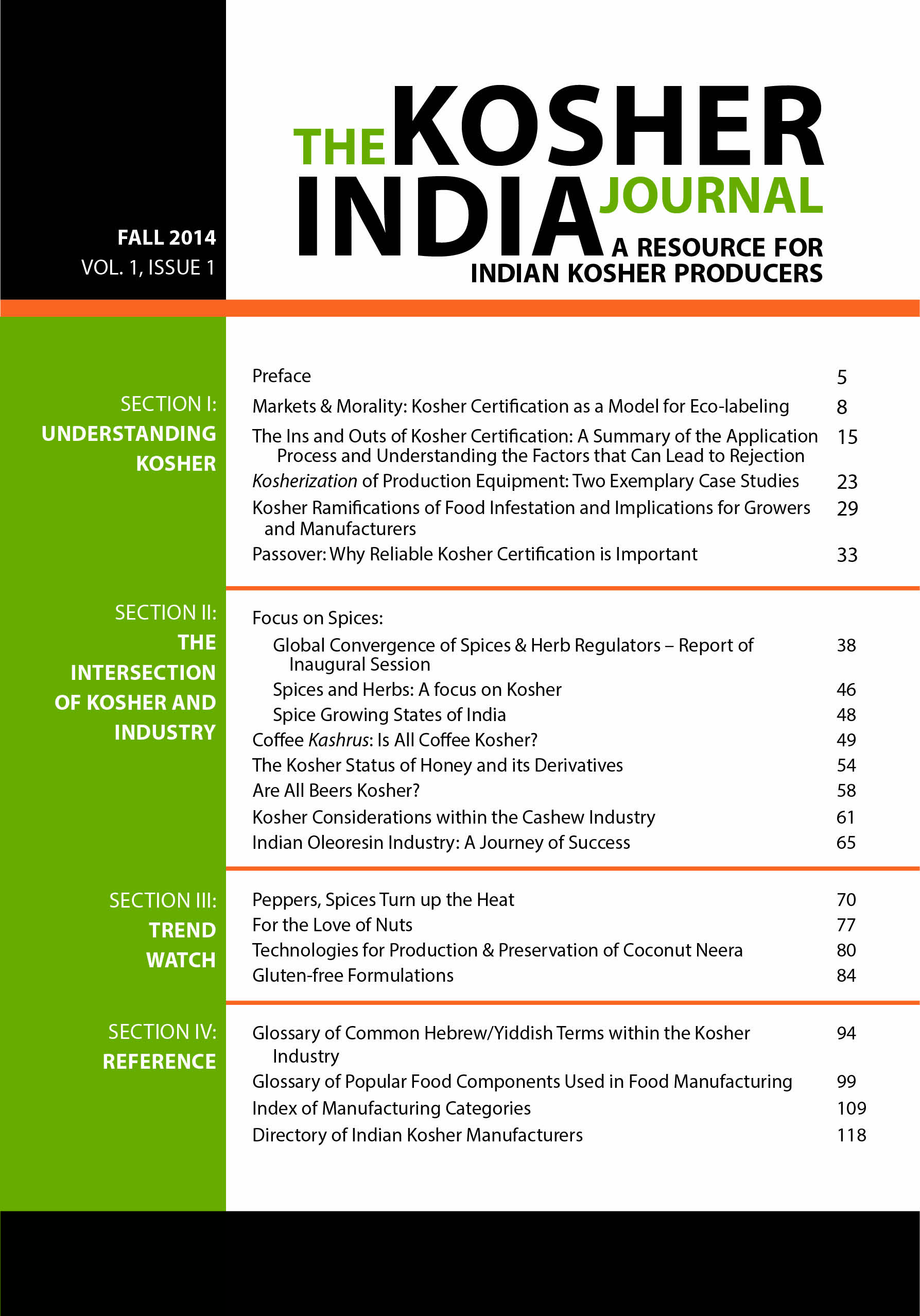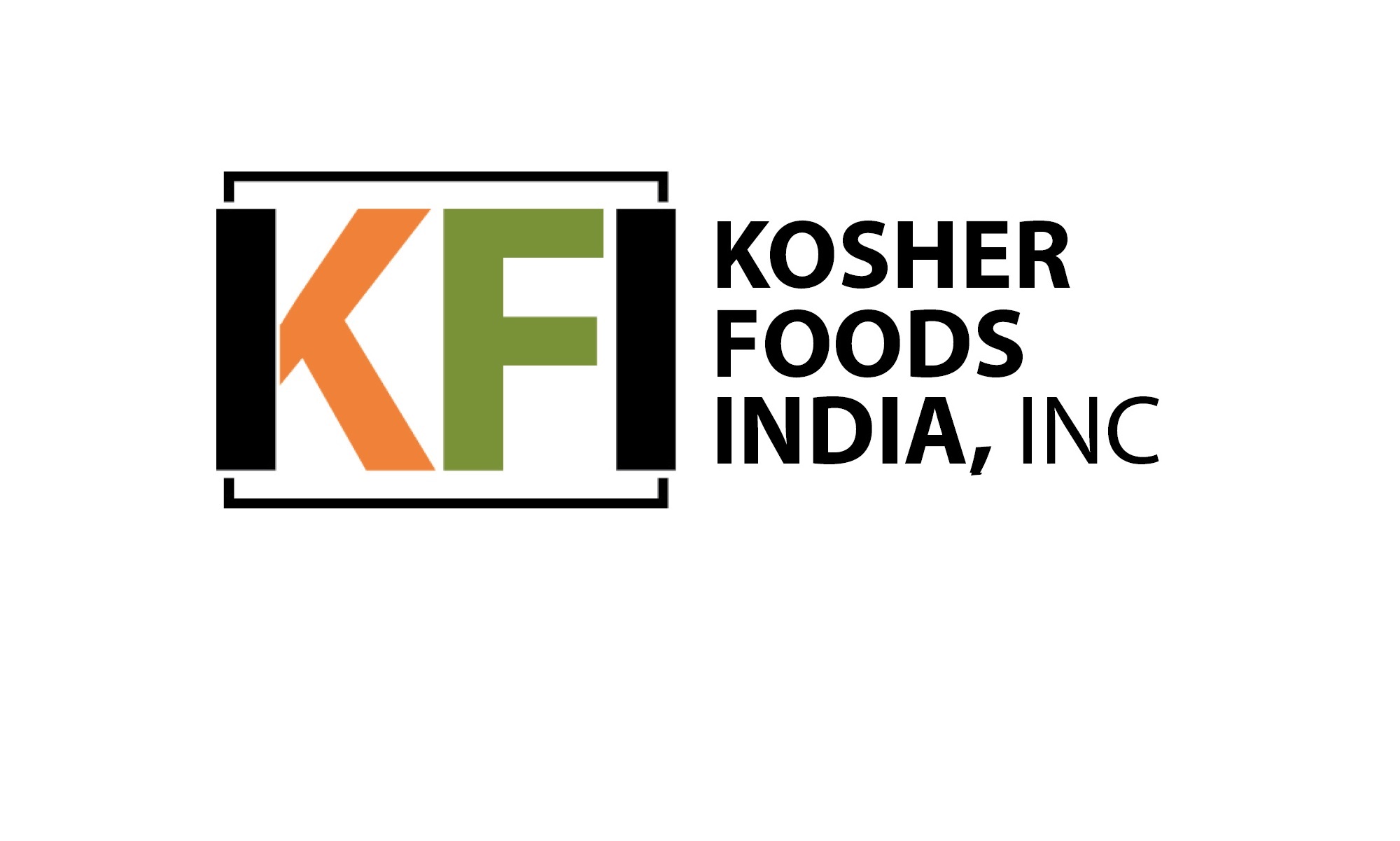
Index of Manufacturing Categories
The Kosher India Journal provides a comprehensive index of Kosher manufacturers by category. These categories are presented here.
Caffeine
Cashews
Catalysts
Cellulose
Chemicals – see Flavor & Fragrance Chemicals, Food Chemicals, or Industrial Chemicals
Chutneys and Pastes
Coconut Products
Coffees
Confections
Dry Mixes
Enzymes
Essential Oils & Oleoresins
Filtering Agents
Flavor & Fragrance Chemicals
Food Additives
Food Chemicals
Food Colors
Freeze Dried
Fruit Blends/Purees
Fruit Concentrates/Fruit Pulps
Fruits, Dehydrated
Fruits, Dried
Fruits, Frozen
Fruits, Frozen
Guar Gums
Herbal & Pharma Extracts
Herbs, Spices & Seasonings, Industrial
Herbs, Spices & Seasonings, Retail
Honey
Industrial Chemicals
Juice & Juice Concentrates, Industrial
Lentils/Beans/Grains
Nuts, Non-Cashew – see also Cashews
Oils, Industrial
Oils, Retail
Pickled Products, Industrial
Pickled Products, Retail
Plastic Products
Poppy Seeds
Preservatives
Rice
Sesame – Oils & Seeds
Soy Products
Starches & Starch Products
Sugar
Sweeteners, Industrial
Teas
Tomato Products, Industrial
Tomato Products, Retail
Vegetables, Canned
Vegetables, Dehydrated
Vegetables, Frozen
Vegetarian Capsules
Vitamin Components
Vitamins & Nutritional Supplements
Yeast
New Edition of Kosher Foods India Journal Released!
Globalization is the watchword of the new millennium, affecting every aspect of our lives, our economies, our industries. A recurring theme in the Fall 2015 edition of The Kosher India Journal (KIJ) that is now available is the recognition of this new reality by both certification agencies and the growers and producers that they certify.
On the one hand, ensuring the kashrus of each and every certified product and raw material has become an increasingly complex effort, requiring closer cooperation between manufacturers and the various certification agencies than ever before. As noted in an article included in this volume by Rabbi Dovid Heber, “every reputable kashrus agency is a stakeholder in this effort.” His article, alongside a pair of others by legal scholar Dr. Timothy Lytton and journalist Sue Fishkoff, help shed light on the history and intricacies of the American industrial kashrus system, and the many ways that this system serves to benefit the client companies being certified.
On the other hand, the explosion of global trade is having both positive and negative impacts on populations in the developing world. Furthermore, the rush to market has the potential to adversely affect the environment as well as the quality and safety of goods being produced. These concerns are being taken seriously by manufacturers around the globe, and several of these, all of whom are Kosher-certified, are profiled in this issue of the journal.
Companies who have adopted Good Agricultural Practices (G.A.P.) and sustainability practices that benefit farmers, growers, and the environment have demonstrated that corporate responsibility can also benefit their bottom line. Many industry experts and trade associates gave of their time and resources to make this issue possible. Our profiles include: JAIN IRRIGATION SYSTEMS, who was just awarded a seventh place ranking in Fortune magazine’s “Change the World Listing” of companies who exemplify what it means to be a good corporate citizen; NEDSPICE, who has demonstrated its commitment to promoting sustainability in the spice trade; and JASMINE CONCRETE, who has worked closely with smallholder farmers to help them derive income from flower cultivation and harvesting. We also offer a profile of the Clinton Foundation’s Accesso Cashew Enterprise program, which is offering indigent cashew growers in India a bright new future with the production of cashew stem juice out of what was until recently considered farming waste.
To address the growing concerns of both consumers and industrial users about the safety and quality of products and raw materials, along with their demand for more ‘natural’ and ‘green’ solutions, manufacturers are responding through innovation, increased attention to traceability, and third-party certifications, including Kosher. The companies spotlighted here are: GREEN CHEM, who has adopted scientific and pharmaceutical protocols to ensure the quality of their herbal ingredients; PRASAN SOLUTIONS, who has innovated natural preservative solutions free of chemical preservatives; and NATURE PURE SUPERCRITICAL, who has developed techniques to meet the growing demand for green solvents.
The mission of KIJ is multi-fold: to impart information about the world of Kosher certification; to explain the role that Indian producers and exporters can expect to play in that world and to provide them with valuable B2B contacts; and to share information about new technologies and developments that would be of interest to our readership. The focus of articles span considerations of Jewish Law, government regulations, market trends, and industry practices. That is true of this issue.
The B2B portion of the journal includes a comprehensive directory of suppliers and points of contact that enables manufacturers to quickly identify and partner with approved sources. As such, KIJ is a vital resource that can abbreviate marketing downtime, shorten the development window, and minimize the inherent risks of contracting with unreliable suppliers. Note that this edition of KIJ has expanded its directory listing to include suppliers in China, Sri Lanka, as well as India.
In the fast-paced, global age in which we live and conduct our businesses, it is more imperative than ever for stakeholders to collaborate, exchange knowledge, and share resources. This journal is but one medium to accomplish some of those objectives. For more information about subscribing to the KIJ, please contact us.
2017 Issue of KIJ B2B: Focus on Colors and Starch
From a marketing standpoint, the benefits of Kosher certification are multi-fold. Aside from helping manufacturers to meet consumer concerns for the safety and traceability of the raw materials they produce, Kosher helps exporters and distributors expand their reach in the marketplace. Kosher certification opens doors to food sellers seeking to accommodate a growing segment of consumers who want assurances that the product they are purchasing is either vegetarian, vegan, lactose-free, gluten-free, shellfish-free, or meets Halal requirements. There are many reasons that consumers look for Kosher and food sellers are stepping up to meet this demand. It is worth noting that nearly 80% of all Kosher food sales is outside of the ‘traditional’ Jewish market.
This issue of The Kosher India Journal (KIJ)The Kosher India Journal (KIJ) features an interview with John Koppel, Senior Vice President at Otis McAllister, a California-based international food conglomerate. Otis’ mission statement touts their desire “to conduct business with all suppliers and clients in an ethical manner.” To uphold that promise, Otis has established several key processes designed to ensure that ethical standards throughout the supply chain are met and maintained. These standards include internal, on-site audits as well as independent audits from third-party certifiers, the most visible of which is Kosher. During our interview, the topic of Otis’ reliance on Kosher certification came up. When asked why Kosher is so critical for them, Mr. Koppel replied, “I think it speaks in very plain language to consumers that this is a good, clean, inspected product . . . It gives the consumer a sense of confidence.” We thank Mr. Otis for giving us his time and sharing his valuable insights with us.
One of our goals for the KIJ going forward is to have each issue focus on a specific theme. In this issue, we have chosen the topics of colors and starch. We start with a pair of articles on these topics by Rabbi Zushe Blech, a highly regarded industrial Kashrus expert. Here he provides a quick overview of the different types and sources of colors and starches, and shares his insights into the various Kashrus issues that manufacturers of these raw materials may confront. Next, we have an article on “New Food Colorants” by Winston Boyd and another on “Hard-working Starches” by Kantha Shelke (both of which first appeared in Prepared Foods magazine) that further expand these related topics. Much thanks to David Feder at Prepared Foods for allowing us to re-use this material in our publication.
Finally, we have included two articles on food safety, always a paramount concern for food manufacturers, that were first published in Food Safety magazine. The first is a roundtable discussion by industry experts about the relationship between food safety and food security. The second addresses the role of ethics in food safety and the harmonization of safety regulations based on science. Both articles appear with the kind permission of Allison Demmert-Poland at Food Safety allowing us to re-publish these works.
Notwithstanding the helpful information provided by the various articles, the centerpiece of the KIJ is always the B2B section, which contains a comprehensive directory of Kosher manufacturers and exporters in India and Sri Lanka. Our listings include an index to the directory by category in each country, and an alpha list of all suppliers and their points of contact.
For more information about KOSHER FOODS INDIA and The Kosher India Journal, please contact us.

